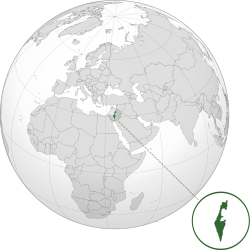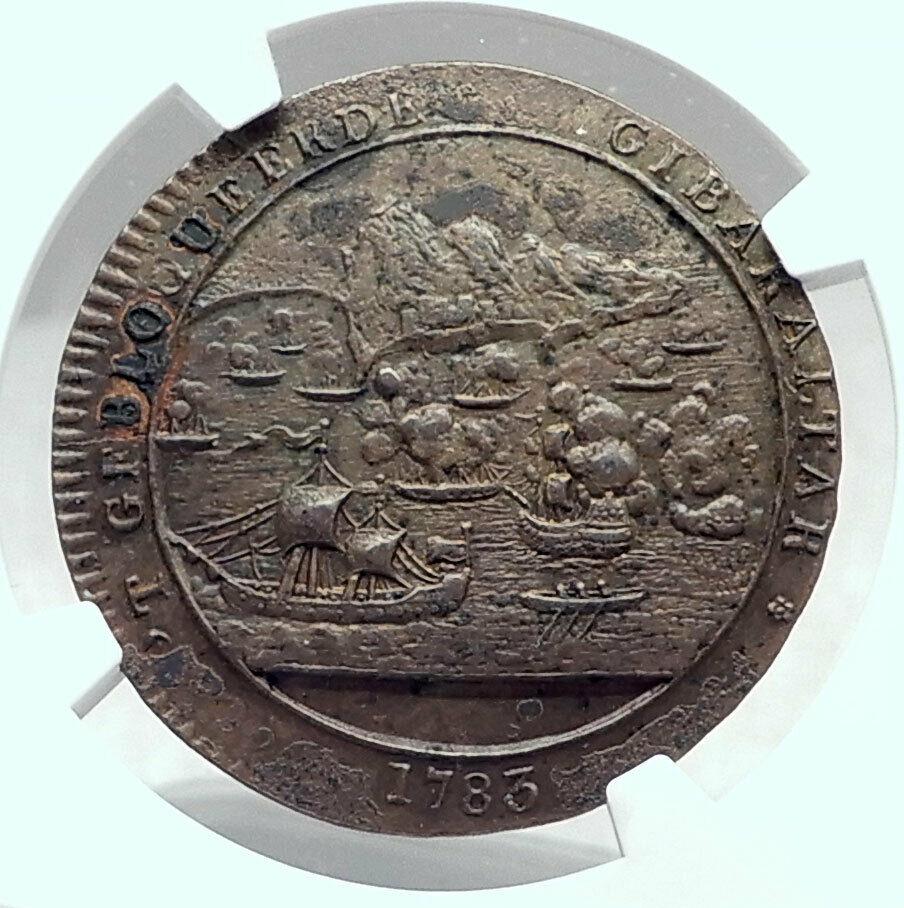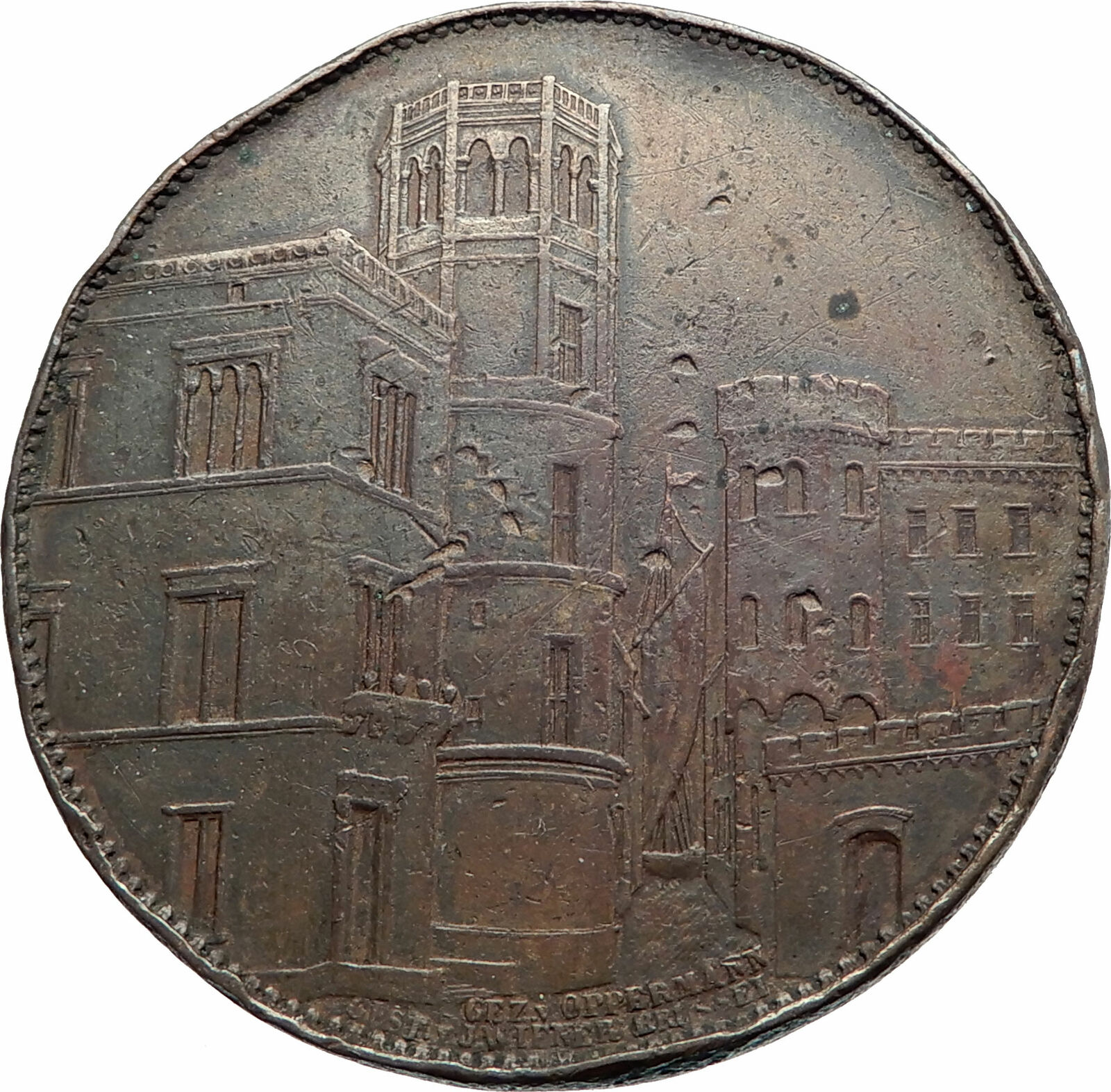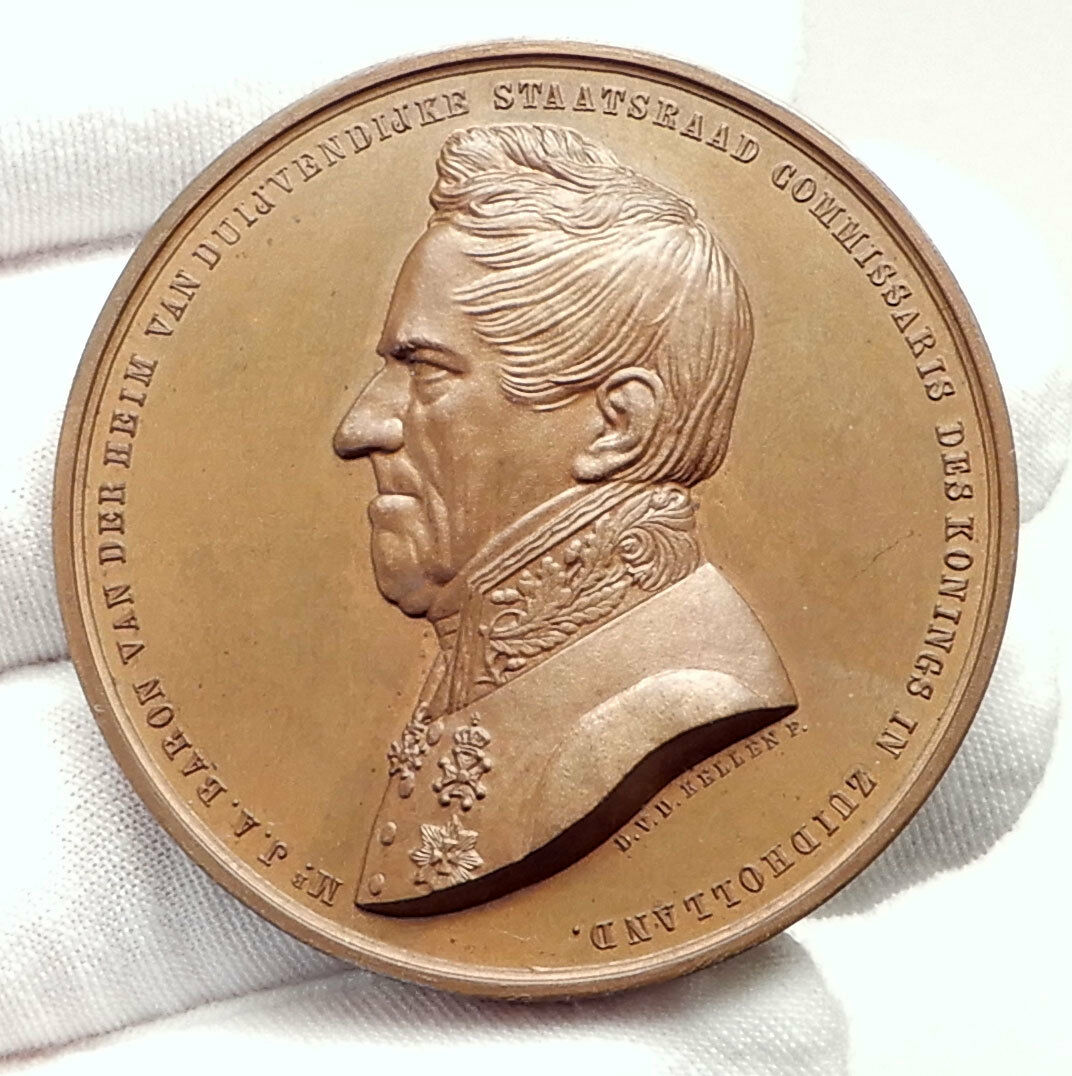|
Israel
Fourth International Harp Competition – Official Award Medal
1970 (5730) Bronze Medal 59mm (95.26 grams) Mint: Hecht
Reference: Cf ICMC# 16024591 | Designer: Fred Pauker, Miriam Karoli, Engraving: Moshe Nov
CINQUIEME CONCOURS INTERNATINOAL DE HARPE JERUSALEM ISRAEL SEPTEMBRE 1970 OFFERTE PAR LE MINISTERE DU TOURISME A, “Nevel” (harp), the “v” forming a harp. In the centre, over two lines, in French “Awarded by the Ministry of Tourism to”.
A raised figure of King David, the poet King, playing a harp. Around the rim, in Hebrew, “The Fourth International Harp Competition Jerusalem, Elul 5730”.
Edge Lettering:
STATE OF ISAEL in Hebrew and English
Medal Notes:
The first three competitions took place partly in Tel Aviv and partly in Jerusalem. Unlike previous competitions which were held tri-annually, 1959- 1962 – 1965, the fourth competition did not take place until 1970.
You are bidding on the exact item pictured, provided with a Certificate of Authenticity and Lifetime Guarantee of Authenticity.
 Israel (Hebrew: יִשְׂרָאֵל; Arabic: إِسْرَائِيل), officially the State of Israel, is a country in the Middle East, on the southeastern shore of the Mediterranean Sea and the northern shore of the Red Sea. It has land borders with Lebanon to the north, Syria to the northeast, Jordan on the east, the Palestinian territories of the West Bank and Gaza Strip to the east and west, respectively, and Egypt to the southwest. The country contains geographically diverse features within its relatively small area. Israel’s economic and technological center is Tel Aviv, while its seat of government and proclaimed capital is Jerusalem, although the state’s sovereignty over Jerusalem has only partial recognition. Israel (Hebrew: יִשְׂרָאֵל; Arabic: إِسْرَائِيل), officially the State of Israel, is a country in the Middle East, on the southeastern shore of the Mediterranean Sea and the northern shore of the Red Sea. It has land borders with Lebanon to the north, Syria to the northeast, Jordan on the east, the Palestinian territories of the West Bank and Gaza Strip to the east and west, respectively, and Egypt to the southwest. The country contains geographically diverse features within its relatively small area. Israel’s economic and technological center is Tel Aviv, while its seat of government and proclaimed capital is Jerusalem, although the state’s sovereignty over Jerusalem has only partial recognition.
 <pisrael has="" evidence="" of="" the="" earliest="" migration="" hominids="" out="" africa.="" canaanite="" tribes="" are="" archaeologically="" attested="" since="" middle="" bronze="" age,="" while="" kingdoms="" israel="" and="" judah="" emerged="" during="" iron="" age.="" neo-assyrian="" empire="" destroyed="" around="" 720="" bce.="" was="" later="" conquered="" by="" babylonian,="" persian="" hellenistic="" empires="" had="" existed="" as="" jewish="" autonomous="" provinces.="" successful="" maccabean="" revolt="" led="" to="" an="" independent="" hasmonean="" kingdom="" 110="" bce,="" which="" in="" 63="" bce="" however="" became="" a="" client="" state="" roman="" republic="" that="" subsequently="" installed="" herodian="" dynasty="" 37="" 6="" ce="" created="" province="" judea.="" judea="" lasted="" until="" failed="" revolts="" resulted="" widespread="" destruction,="" expulsion="" population="" renaming="" region="" from="" Iudaea to Syria Palaestina.[34] Jewish presence in the region has persisted to a certain extent over the centuries. In the 7th century the Levant was taken from the Byzantine Empire by the Arabs and remained in Muslim control until the First Crusade of 1099, followed by the Ayyubid conquest of 1187. The Mamluk Sultanate of Egypt extended its control over the Levant in the 13th century until its defeat by the Ottoman Empire in 1517. During the 19th century, national awakening among Jews led to the establishment of the Zionist movement in the diaspora followed by waves of immigration to Ottoman and later British Palestine. <pisrael has="" evidence="" of="" the="" earliest="" migration="" hominids="" out="" africa.="" canaanite="" tribes="" are="" archaeologically="" attested="" since="" middle="" bronze="" age,="" while="" kingdoms="" israel="" and="" judah="" emerged="" during="" iron="" age.="" neo-assyrian="" empire="" destroyed="" around="" 720="" bce.="" was="" later="" conquered="" by="" babylonian,="" persian="" hellenistic="" empires="" had="" existed="" as="" jewish="" autonomous="" provinces.="" successful="" maccabean="" revolt="" led="" to="" an="" independent="" hasmonean="" kingdom="" 110="" bce,="" which="" in="" 63="" bce="" however="" became="" a="" client="" state="" roman="" republic="" that="" subsequently="" installed="" herodian="" dynasty="" 37="" 6="" ce="" created="" province="" judea.="" judea="" lasted="" until="" failed="" revolts="" resulted="" widespread="" destruction,="" expulsion="" population="" renaming="" region="" from="" Iudaea to Syria Palaestina.[34] Jewish presence in the region has persisted to a certain extent over the centuries. In the 7th century the Levant was taken from the Byzantine Empire by the Arabs and remained in Muslim control until the First Crusade of 1099, followed by the Ayyubid conquest of 1187. The Mamluk Sultanate of Egypt extended its control over the Levant in the 13th century until its defeat by the Ottoman Empire in 1517. During the 19th century, national awakening among Jews led to the establishment of the Zionist movement in the diaspora followed by waves of immigration to Ottoman and later British Palestine.
 In 1947, the United Nations adopted a Partition Plan for Palestine recommending the creation of independent Arab and Jewish states and an internationalized Jerusalem. The plan was accepted by the Jewish Agency, and rejected by Arab leaders. The following year, the Jewish Agency declared the independence of the State of Israel, and the subsequent 1948 Arab-Israeli War saw Israel’s establishment over most of the former Mandate territory, while the West Bank and Gaza were held by neighboring Arab states. Israel has since fought several wars with Arab countries, and it has since 1967 occupied territories including the West Bank, Golan Heights and the Gaza Strip (still considered occupied after 2005 disengagement, although some legal experts dispute this claim)..[41][42][43][fn 4] It extended its laws to the Golan Heights and East Jerusalem, but not the West Bank. Israel’s occupation of the Palestinian territories is the world’s longest military occupation in modern times.[fn 4][49] Efforts to resolve the Israeli-Palestinian conflict have not resulted in a final peace agreement. However, peace treaties between Israel and both Egypt and Jordan have been signed. In 1947, the United Nations adopted a Partition Plan for Palestine recommending the creation of independent Arab and Jewish states and an internationalized Jerusalem. The plan was accepted by the Jewish Agency, and rejected by Arab leaders. The following year, the Jewish Agency declared the independence of the State of Israel, and the subsequent 1948 Arab-Israeli War saw Israel’s establishment over most of the former Mandate territory, while the West Bank and Gaza were held by neighboring Arab states. Israel has since fought several wars with Arab countries, and it has since 1967 occupied territories including the West Bank, Golan Heights and the Gaza Strip (still considered occupied after 2005 disengagement, although some legal experts dispute this claim)..[41][42][43][fn 4] It extended its laws to the Golan Heights and East Jerusalem, but not the West Bank. Israel’s occupation of the Palestinian territories is the world’s longest military occupation in modern times.[fn 4][49] Efforts to resolve the Israeli-Palestinian conflict have not resulted in a final peace agreement. However, peace treaties between Israel and both Egypt and Jordan have been signed.
In its Basic Laws, Israel defines itself as a Jewish and democratic state. Israel is a representative democracy with a parliamentary system, proportional representation and universal suffrage. The prime minister is head of government and the Knesset is the legislature. Israel is a developed country and an OECD member, with the 32nd-largest economy in the world by nominal gross domestic product as of 2017. The country benefits from a highly skilled workforce and is among the most educated countries in the world with one of the highest percentages of its citizens holding a tertiary education degree. Israel has the highest standard of living in the Middle East, and has one of the highest life expectancies in the world.
|





 Israel (Hebrew: יִשְׂרָאֵל; Arabic: إِسْرَائِيل), officially the State of Israel, is a country in the Middle East, on the southeastern shore of the Mediterranean Sea and the northern shore of the Red Sea. It has land borders with Lebanon to the north, Syria to the northeast, Jordan on the east, the Palestinian territories of the West Bank and Gaza Strip to the east and west, respectively, and Egypt to the southwest. The country contains geographically diverse features within its relatively small area. Israel’s economic and technological center is Tel Aviv, while its seat of government and proclaimed capital is Jerusalem, although the state’s sovereignty over Jerusalem has only partial recognition.
Israel (Hebrew: יִשְׂרָאֵל; Arabic: إِسْرَائِيل), officially the State of Israel, is a country in the Middle East, on the southeastern shore of the Mediterranean Sea and the northern shore of the Red Sea. It has land borders with Lebanon to the north, Syria to the northeast, Jordan on the east, the Palestinian territories of the West Bank and Gaza Strip to the east and west, respectively, and Egypt to the southwest. The country contains geographically diverse features within its relatively small area. Israel’s economic and technological center is Tel Aviv, while its seat of government and proclaimed capital is Jerusalem, although the state’s sovereignty over Jerusalem has only partial recognition. <pisrael has="" evidence="" of="" the="" earliest="" migration="" hominids="" out="" africa.="" canaanite="" tribes="" are="" archaeologically="" attested="" since="" middle="" bronze="" age,="" while="" kingdoms="" israel="" and="" judah="" emerged="" during="" iron="" age.="" neo-assyrian="" empire="" destroyed="" around="" 720="" bce.="" was="" later="" conquered="" by="" babylonian,="" persian="" hellenistic="" empires="" had="" existed="" as="" jewish="" autonomous="" provinces.="" successful="" maccabean="" revolt="" led="" to="" an="" independent="" hasmonean="" kingdom="" 110="" bce,="" which="" in="" 63="" bce="" however="" became="" a="" client="" state="" roman="" republic="" that="" subsequently="" installed="" herodian="" dynasty="" 37="" 6="" ce="" created="" province="" judea.="" judea="" lasted="" until="" failed="" revolts="" resulted="" widespread="" destruction,="" expulsion="" population="" renaming="" region="" from="" Iudaea to Syria Palaestina.[34] Jewish presence in the region has persisted to a certain extent over the centuries. In the 7th century the Levant was taken from the Byzantine Empire by the Arabs and remained in Muslim control until the First Crusade of 1099, followed by the Ayyubid conquest of 1187. The Mamluk Sultanate of Egypt extended its control over the Levant in the 13th century until its defeat by the Ottoman Empire in 1517. During the 19th century, national awakening among Jews led to the establishment of the Zionist movement in the diaspora followed by waves of immigration to Ottoman and later British Palestine.
<pisrael has="" evidence="" of="" the="" earliest="" migration="" hominids="" out="" africa.="" canaanite="" tribes="" are="" archaeologically="" attested="" since="" middle="" bronze="" age,="" while="" kingdoms="" israel="" and="" judah="" emerged="" during="" iron="" age.="" neo-assyrian="" empire="" destroyed="" around="" 720="" bce.="" was="" later="" conquered="" by="" babylonian,="" persian="" hellenistic="" empires="" had="" existed="" as="" jewish="" autonomous="" provinces.="" successful="" maccabean="" revolt="" led="" to="" an="" independent="" hasmonean="" kingdom="" 110="" bce,="" which="" in="" 63="" bce="" however="" became="" a="" client="" state="" roman="" republic="" that="" subsequently="" installed="" herodian="" dynasty="" 37="" 6="" ce="" created="" province="" judea.="" judea="" lasted="" until="" failed="" revolts="" resulted="" widespread="" destruction,="" expulsion="" population="" renaming="" region="" from="" Iudaea to Syria Palaestina.[34] Jewish presence in the region has persisted to a certain extent over the centuries. In the 7th century the Levant was taken from the Byzantine Empire by the Arabs and remained in Muslim control until the First Crusade of 1099, followed by the Ayyubid conquest of 1187. The Mamluk Sultanate of Egypt extended its control over the Levant in the 13th century until its defeat by the Ottoman Empire in 1517. During the 19th century, national awakening among Jews led to the establishment of the Zionist movement in the diaspora followed by waves of immigration to Ottoman and later British Palestine.  In 1947, the United Nations adopted a Partition Plan for Palestine recommending the creation of independent Arab and Jewish states and an internationalized Jerusalem. The plan was accepted by the Jewish Agency, and rejected by Arab leaders. The following year, the Jewish Agency declared the independence of the State of Israel, and the subsequent 1948 Arab-Israeli War saw Israel’s establishment over most of the former Mandate territory, while the West Bank and Gaza were held by neighboring Arab states. Israel has since fought several wars with Arab countries, and it has since 1967 occupied territories including the West Bank, Golan Heights and the Gaza Strip (still considered occupied after 2005 disengagement, although some legal experts dispute this claim)..[41][42][43][fn 4] It extended its laws to the Golan Heights and East Jerusalem, but not the West Bank. Israel’s occupation of the Palestinian territories is the world’s longest military occupation in modern times.[fn 4][49] Efforts to resolve the Israeli-Palestinian conflict have not resulted in a final peace agreement. However, peace treaties between Israel and both Egypt and Jordan have been signed.
In 1947, the United Nations adopted a Partition Plan for Palestine recommending the creation of independent Arab and Jewish states and an internationalized Jerusalem. The plan was accepted by the Jewish Agency, and rejected by Arab leaders. The following year, the Jewish Agency declared the independence of the State of Israel, and the subsequent 1948 Arab-Israeli War saw Israel’s establishment over most of the former Mandate territory, while the West Bank and Gaza were held by neighboring Arab states. Israel has since fought several wars with Arab countries, and it has since 1967 occupied territories including the West Bank, Golan Heights and the Gaza Strip (still considered occupied after 2005 disengagement, although some legal experts dispute this claim)..[41][42][43][fn 4] It extended its laws to the Golan Heights and East Jerusalem, but not the West Bank. Israel’s occupation of the Palestinian territories is the world’s longest military occupation in modern times.[fn 4][49] Efforts to resolve the Israeli-Palestinian conflict have not resulted in a final peace agreement. However, peace treaties between Israel and both Egypt and Jordan have been signed. 




